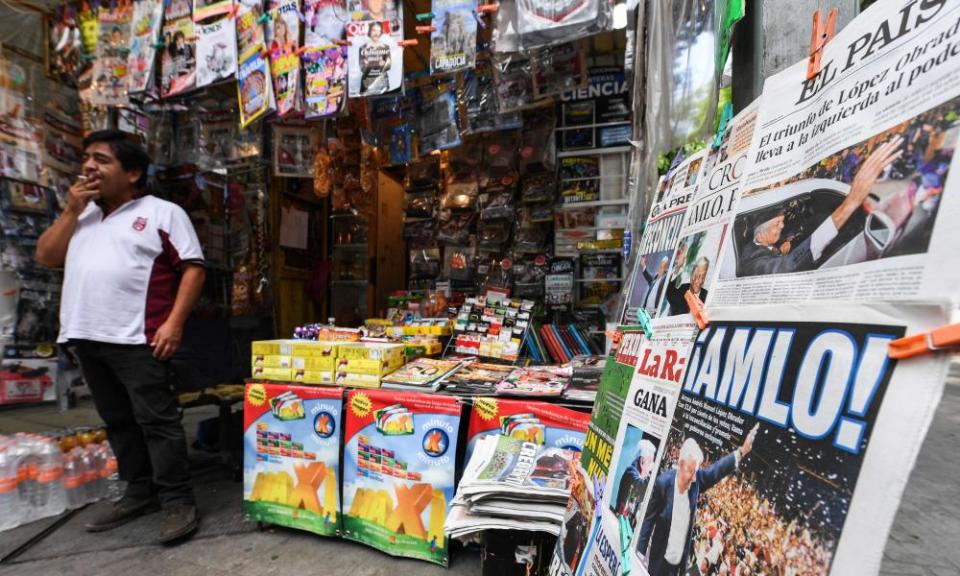Amlo's allies: the footballer, the militia leader and environmental scientist
The president-elect’s ideologically diverse coalition has led to some surprising candidates winning on his coattails

Andrés Manuel López Obrador won a decisive victory in Mexico’s presidential elections, but his electoral coalition also scored a string of successes in gubernatorial and mayoral races across the country – as well as seizing the largest number of seats in congress.
López Obrador, best known as Amlo, had pitched a big tent which included two former leaders of the right-leaning National Action party (Pan), as well as the Social Encounter party (PES), which was founded by Evangelicals in 2014.
Among those candidates who rode into office on Amlo’s coattails were an environmental scientist who became Mexico City’s first elected female mayor; a pugnacious former footballer; and the leader of a citizen’s militia who ran narco-traffickers from her town – but ended up in prison on kidnapping charges.

Claudia Sheinbaum Pardo
Sheinbaum – a former member of the Intergovernmental Panel on Climate Change – became the capital city’s first female elected mayor after winning a landslide for Amlo’s party, Morena.
A former environment minister for Mexico City, Sheinbaum is a specialist on vehicle emissions and climate change mitigation, and supporters say her experience makes her uniquely qualified to tackle the capital’s chronic water and transport problems.
She’s no stranger to the rough and tumble of Mexico City politics, having served as chief of the Tlalpan borough – which was hit hard in the September 2017 earthquake. Her win reflected the left’s dominance in the capital, where social policies have long been more progressive than the country at large.

Cuauhtémoc Blanco
As a striker, Blanco outmaneuvered opponents with a move called the cuauhtemiña, in which he gripped the ball between his feet and hopped past defenders. Now, he has bamboozled the country’s political establishment by winning a whopping 50% of the vote in the Morelos state governor’s race.
Commonly called “Cuauh”, Blanco hailed from the tough streets of Mexico City’s notoriously rough Tepito barrio and drew controversy and wild popularity for his bad-boy antics. In 2015 he switched to politics, winning the mayor’s race in Cuernavaca for the PES, a conservative, evangelical Christian political party that opposes same-sex marriage and abortion.
Blanco didn’t show much enthusiasm for his political career at the start. But amid widespread disgust over political corruption – and rumours that local officials had stolen relief funds for victims of this year’s devastating earthquake – Blanco easily won the governship of the state of Morelos.
Nestora Salgado
Salgado, a dual US-Mexico citizen, was living in Seattle, but in 2012 she returned to her hometown of Olinalá in the heroin-producing heartland of Guerrero state to lead an armed rebellion against drug traffickers and corrupt local authorities – only to be accused of kidnapping and imprisoned.
The United Nations working group on arbitrary detention said her arrest was arbitrary, but Salgado spent three years in prison before the charges were eventually dismissed.
She is likely to claim a senate seat for Morena. But she became controversial in the campaign after José Antonio Meade, the candidate for the ruling Institutional Revolutionary party, PRI, called her a “kidnapper”– part of a strategy of trying to present Amlo as soft on crime. Salgado has threatened to sue Meade – who finished a distant third on Sunday – for defamation.
Napoleón Gómez Urrutia
The leader of a miners’ union who fled to Canada after being accused of misappropriating a $55m workers’ trust fund, Gómez now resides in the Vancouver area. He denies the allegations, which were never proven in court, and says he left Mexico due to political persecution for winning pay rises.
In a country where union bosses are often passive and allied with employers, Gómez is known for leading long strikes, but families of 65 miners killed in a 2006 explosion in the Pasta de Conchos mine allege Gómez’s union did little for them: the union and government signed a joint safety report 12 days before the disaster. Gómez will probably take a seat in the senate.
Gabriela Cuevas
Cuevas, 39, made history in the early 2000s as the youngest-ever member of Mexico’s Congress for the rightwing Pan, and has an ambiguous history with Amlo. During his 2000-2005 term as mayor of Mexico City, she was notorious for following him around and attempting to goad him into intemperate outbursts. When Amlo was arrested in 2005 on allegations of violating a court order – in what he said was part of dirty tricks campaign to disqualify him from the 2006 election – she paid his bail, saying that pictures of him behind bars would allow him to become a martyr.
But after spending her adult life in Pan politics, she jumped to Morena earlier this year – to keep her hopes of winning another elected position alive, critics contended. She will probably enter the lower house, where Morena and its allies won a majority.

